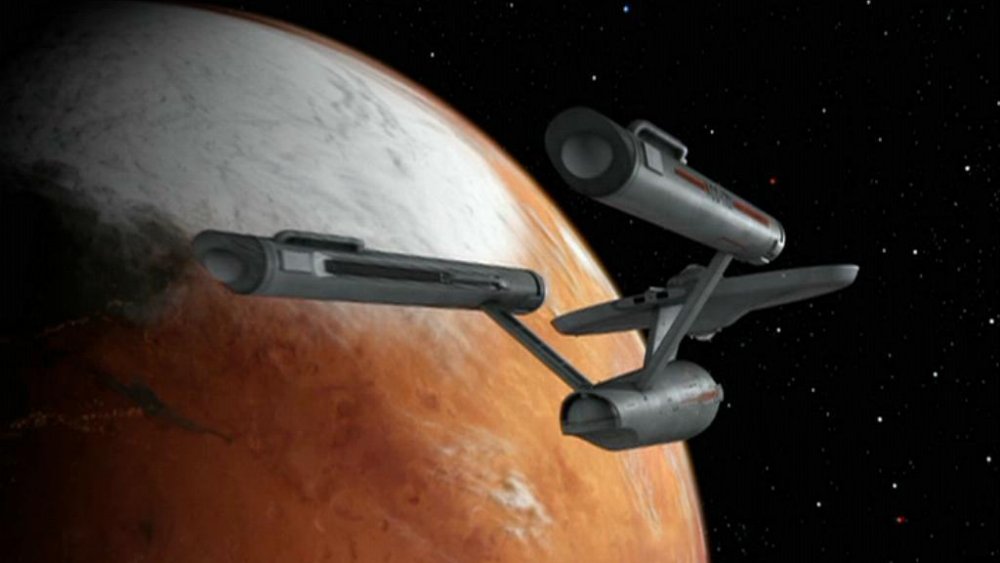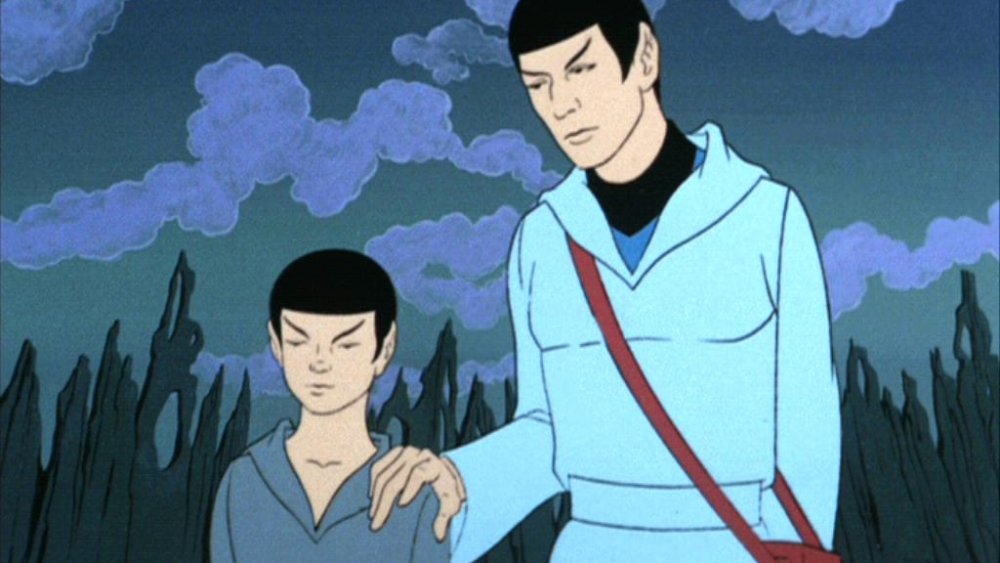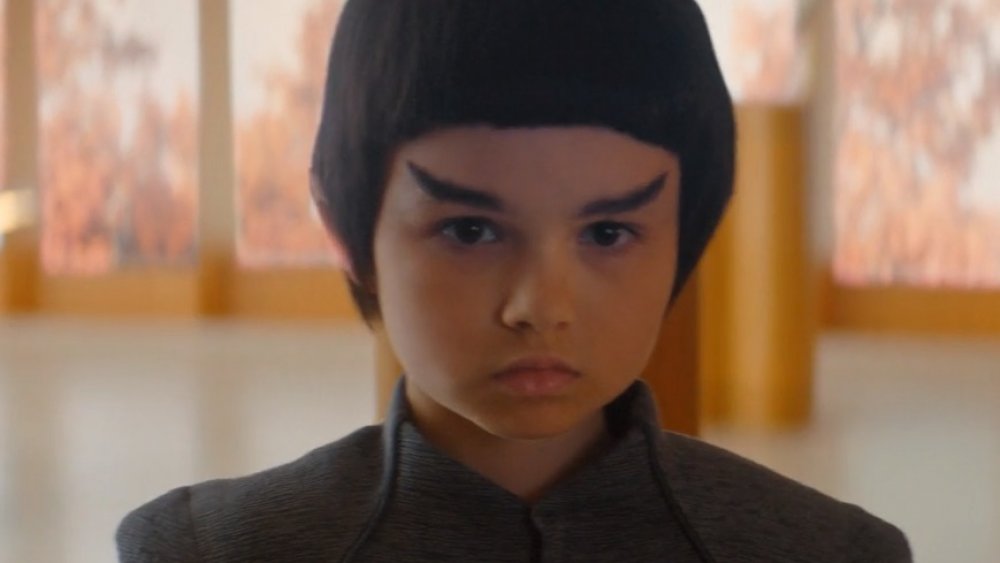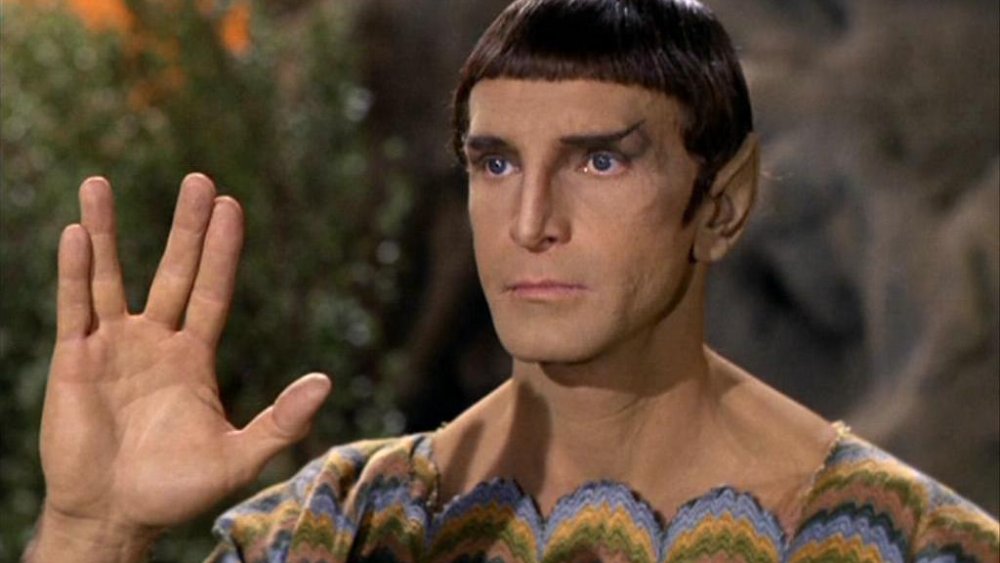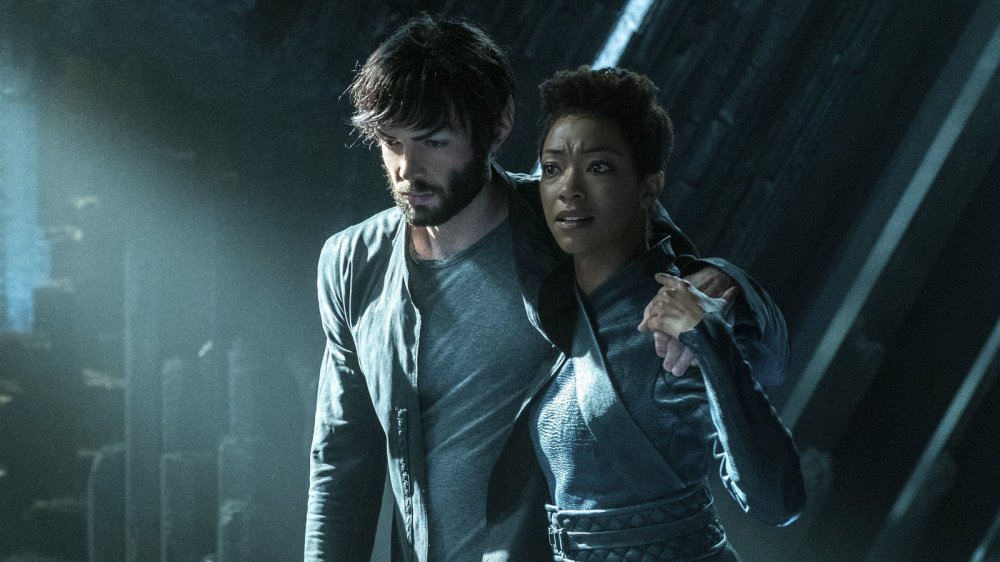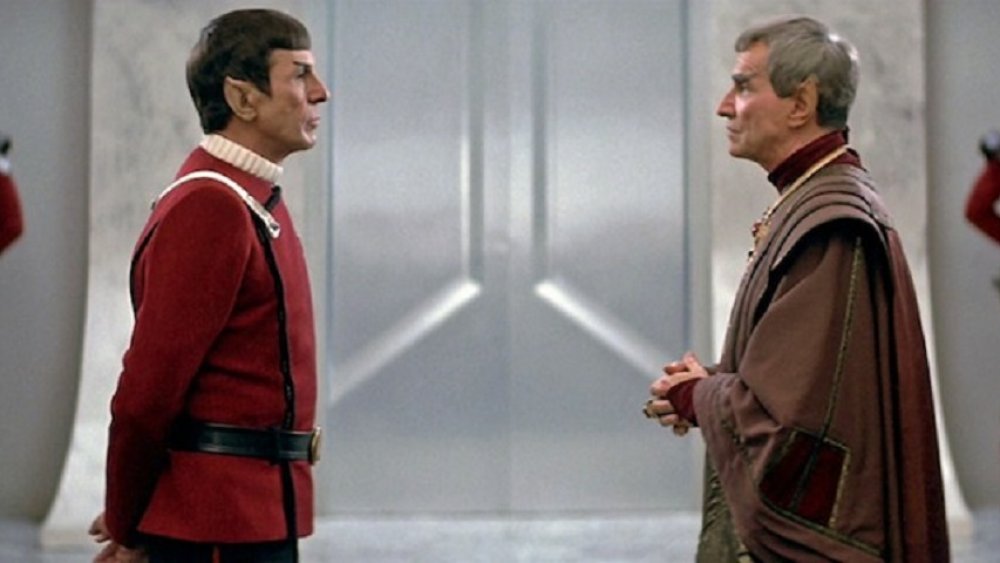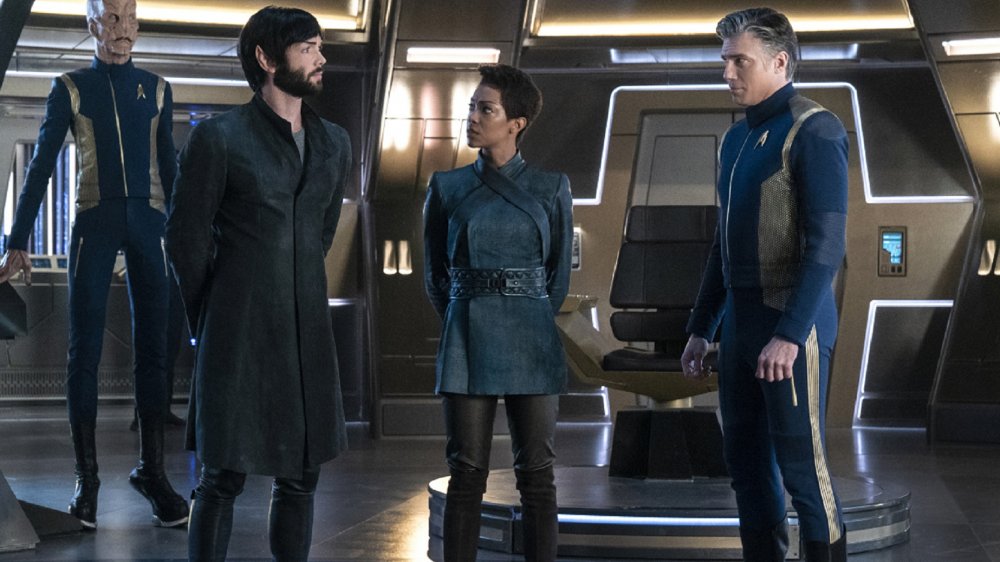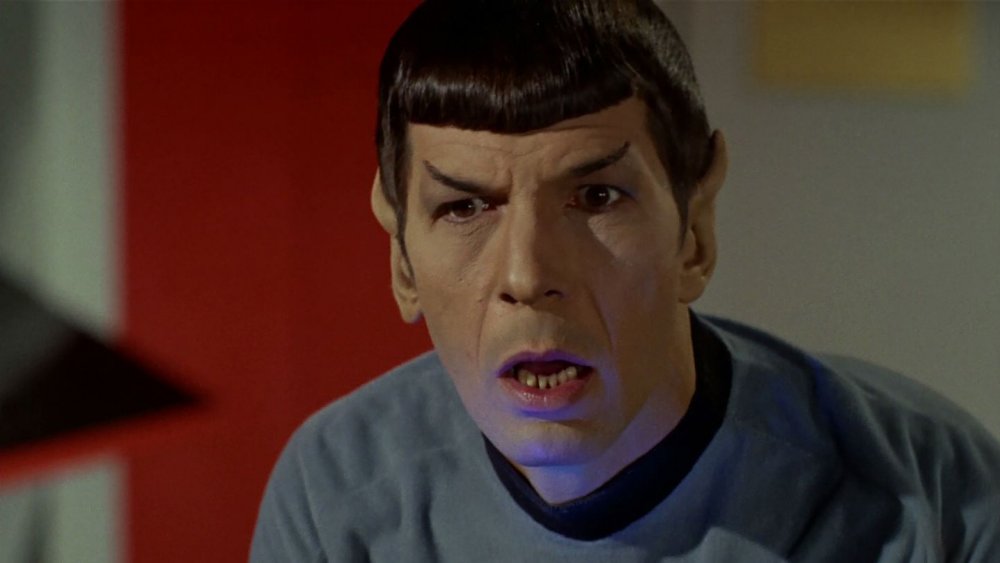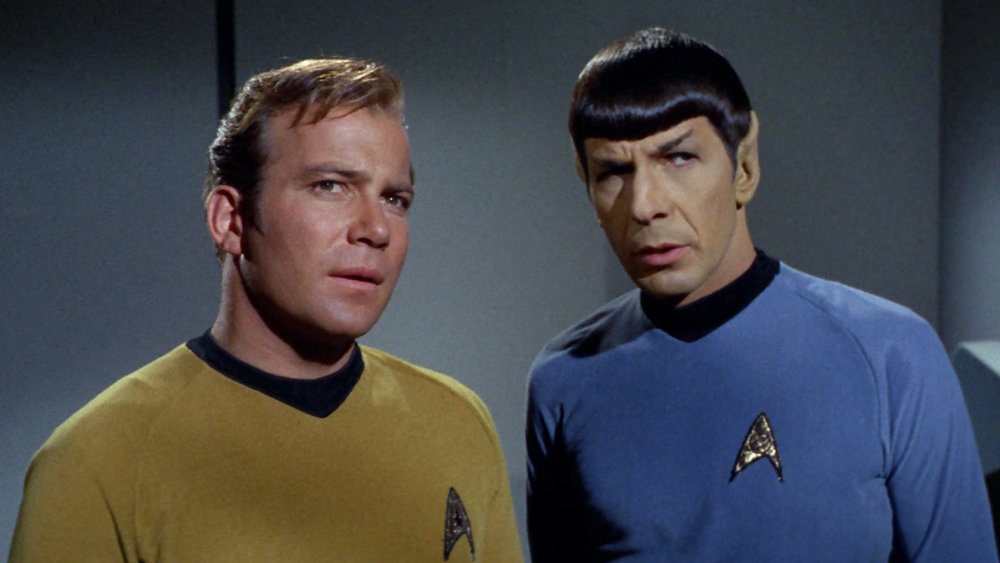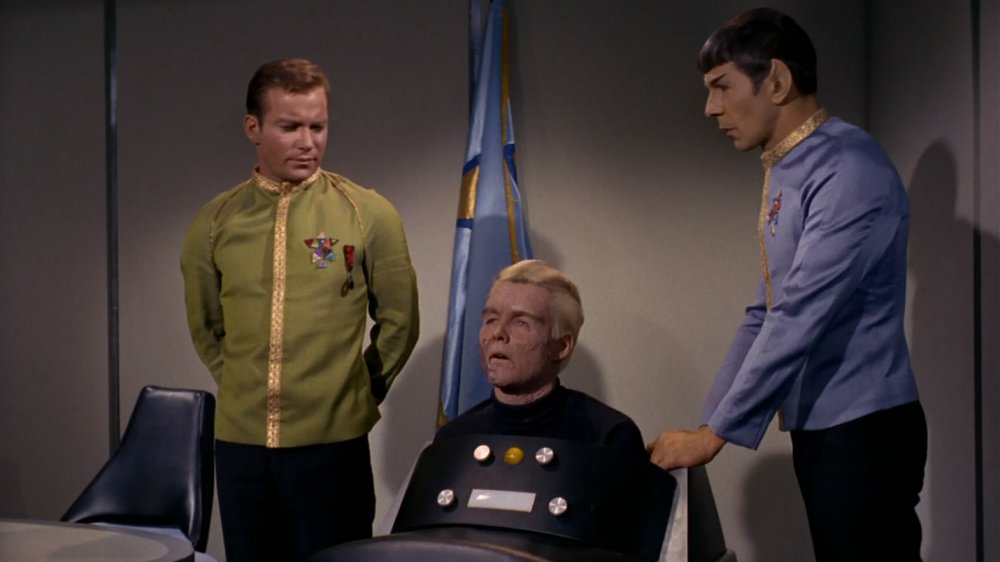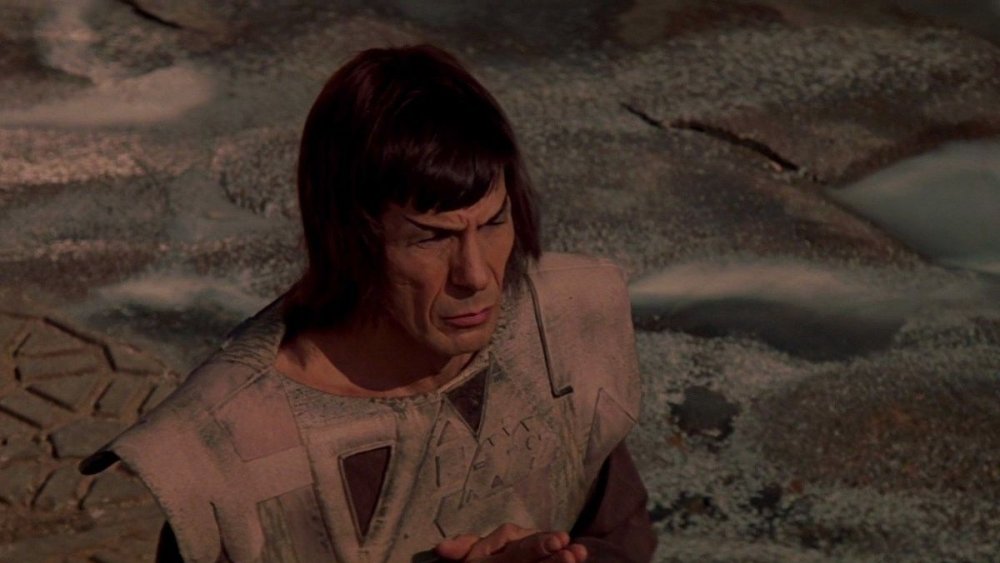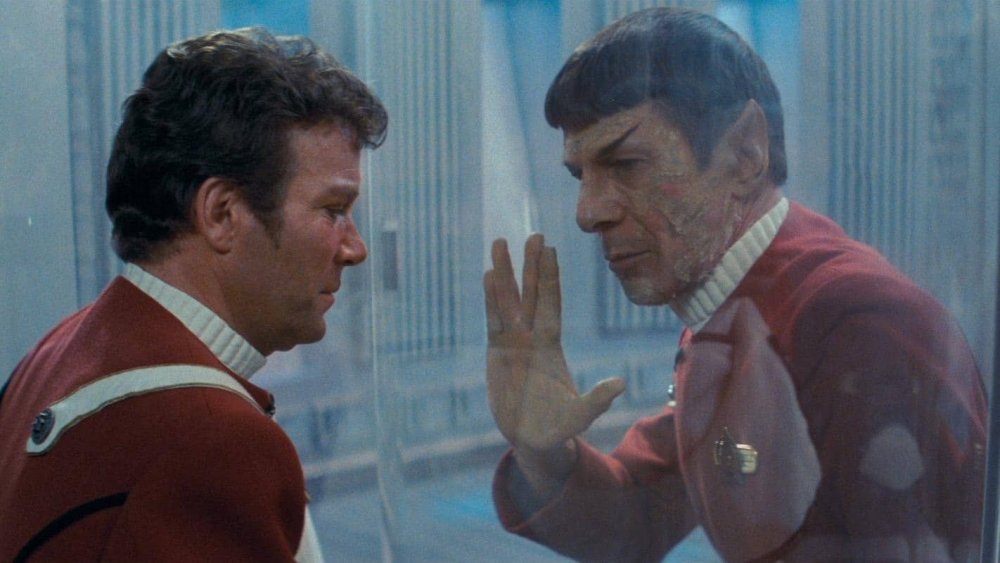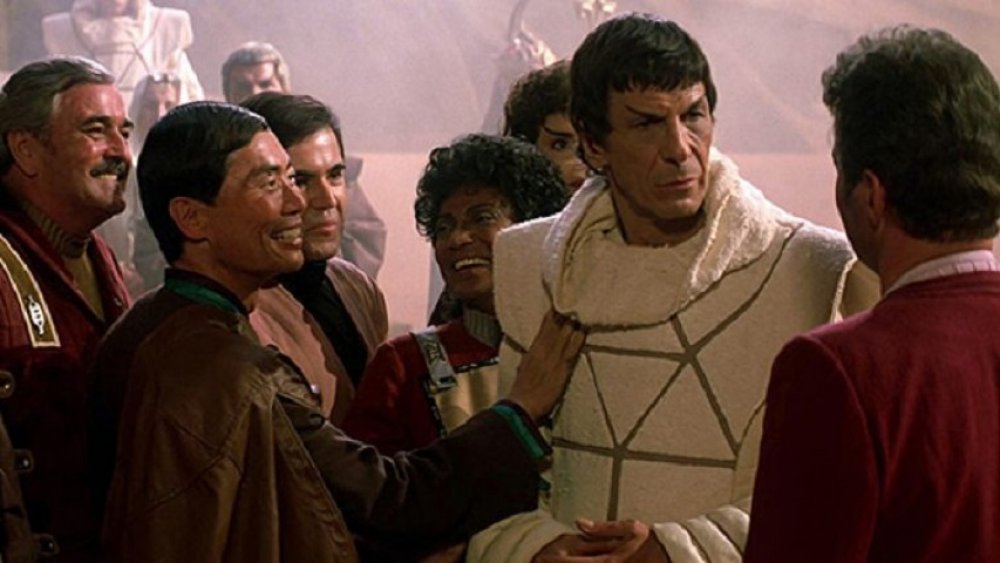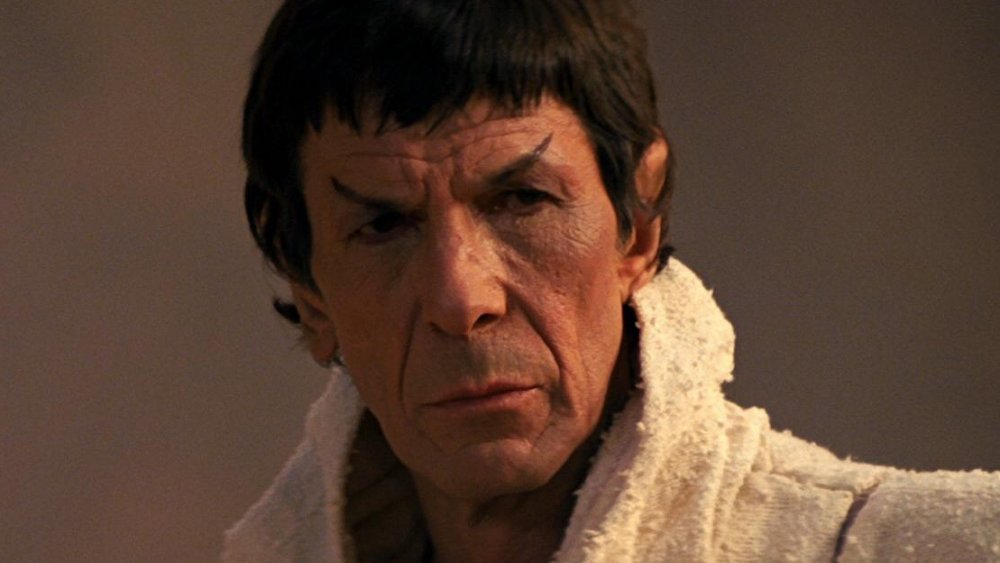Spock's Entire Backstory Explained
When it comes to Star Trek laymen, Captain James T. Kirk gets all the love. But die-hard Trekkies are all about Spock.
Where Kirk was a space-faring brawler with a galactically large libido, Spock was a character after the typical nerd's own heart. The half-Vulcan Starfleet officer could disable an opponent with a well-placed pinch, but he was much more likely to use deductive reasoning and logic to sort out his problems. Couple that fan favorite with Leonard Nimoy's incredible gift for conveying the emotions of a pathologically logical outsider, and it's no wonder that Spock has endured for as long as the fictional universe itself.
The constant allure of Trek and each generation's desire to return to Starfleet's endless story-generating capabilities means there are always greenhorns and redshirts coming to Trek for the first time. With decades of lore to digest, getting a grip on a character like Spock can be difficult. So, we've put together a bit of a primer on a character who's lived long and prospered throughout Trek's many incarnations.
To understand Spock, you've got to understand Vulcans
When any newcomer first starts watching Star Trek, their first question is probably, "Why does Spock look like that?"
Well, Spock is half-human, half-Vulcan, and he was born on the planet Vulcan (pictured) in the 23rd century. The Vulcans, along with the humans of Earth, are one of the four founding groups of the United Federation of Planets, so Spock grew up in a civilization under the sway of this intergalactic government. His mother was a human schoolteacher who came from Earth and lived on Vulcan with Spock's father, Sarek. The couple met and fell in love while Sarek was performing his duties as a Vulcan ambassador to the Federation. With both parents dedicated to the public good, Spock's eventual career path as a space-traveling peacekeeper for the Federation makes a good bit of sense, though that decision was far off from Spock's early years in the city of ShiKahr. In fact, given how poorly he was treated as a young boy, it's a wonder the drive for civil service survived.
As a child, Spock was an outsider
Spock had an incredibly difficult time in his childhood, being roundly mocked and ridiculed for his half-human heritage on the almost entirely homogeneous planet of Vulcan. The Vulcan children around him liked to provoke him and then ridicule him for responding emotionally, a faux pas in the logic-based society of Vulcan. Spock's father had a full-blooded Vulcan son named Sybok, and Sarek initially looked at his half-human son with barely disguised revulsion. Through considerable effort, Spock would come to suppress his emotions in the Vulcan way, while his fully Vulcan half-brother would become a revolutionary against the cold logic of his people, due to a deep-seated belief in the concept of Heaven.
Becoming his indefatigably logical self took time and work, however, and Vulcan schoolchildren were more than willing to make his job harder. As if that wasn't enough, Spock suffered from dyslexia. He inherited the condition from his mother's side of the family, and she worked extensively with Spock to teach him how to read and avoid further stigmatization.
Spock proved himself as a young boy
Spock didn't take long to reach his limit. He was unusually emotional for a Vulcan, and the insistent prodding only made it worse. As such, Spock had a chip on his shoulder from a very early age, hoping to prove his doubters wrong and fully belong in Vulcan society. Vulcan's harsh code of logical living and extreme belief in problem-solving permeated every aspect of their society, including their rituals that marked the beginning of adulthood.
For example, every young Vulcan had to go through the kahs-wan, a ritual that required young Vulcans to live in the desert for ten days without food, water, or weapons. The Vulcans believed that such self-reliance was a bulwark against getting too soft and that it provided a connection to the planet's ancient warrior past. Spock took the test for the first time at the age of seven, pushed to get it over with due to his treatment by full Vulcans. But he very nearly died in an attack by a large mountain lion, only being saved by his pet I-Chaya. His companion animal was badly mauled by the beast's venomous claws, and Spock had to decide whether to fight to save it or let it die.
Given the agony that I-Chaya was feeling, Spock felt that he should let his friend die, though it caused him great pain. At that moment, Spock dedicated himself to the Vulcan way of thinking. He would follow the teachings of the Vulcan philosopher Surak, who preached logic and emotional control as the foundation of a life well-lived.
How Vulcans adopted logic and reason
In spite of their mistreatment of a young and moody Spock, Vulcans weren't always so dedicated to reason. Much like Earth, they spent centuries at war with one another. They developed atomic weapons around the time of 300 AD, and war threatened all life on their planet. In this time, the philosopher Surak created a monastery in the Vulcan desert and began teaching that all the world's ills were due to a failure to suppress emotion and think logically. His followers began to spread his message throughout Vulcan where it was met with open hostility from certain groups. Yet another war raged between adherents of Surak's logic-first worldview and people who believed in the rule of emotion. An atomic blast in one of these wars killed the philosopher, turning him into a martyr.
Eventually, the logicians won out, with holdouts leaving Vulcan to go and found the Romulan Empire, a noted enemy of the Federation throughout Star Trek's run. Other Vulcans became nomads who took a heretical stance toward Surak's teachings that would eventually line up with Spock's life. They felt that controlling emotion didn't mean outright suppression but rather allowing yourself to feel and then tamping it down.
Spock's complicated relationship with his sister
Centuries after the logic-based "Time of Awakening," the emotions of early Vulcans had been largely forgotten. This led Spock's own father to view his son's weakness for the illogical with contempt. And though he did his best to hide it, it was clear from Spock's actions that he could tell how his father thought of him. He would act out even after taking his test of maturity, disappearing into the wilderness for days at a time without telling his father where he went.
Around the same time, his family adopted a fully human daughter after two visiting scientists died on Vulcan. The curiously named Michael Burnham came to live with them, and Spock instantly felt attached to this new outsider. He followed the older girl around, even as her presence on the planet stirred up danger. Extremist believers in Vulcan philosophies began to target Burnham, and she tried to run away so that her new family wouldn't be harmed in any planned attack.
While trying to find her, Spock was visited by a spirit he called "the Red Angel," which told him where to find Burnham. This inexplicable paranormal event would have a lasting impact on Spock, as it fell outside of the realm of his logical beliefs and still accurately led to Burnham. However, when Spock found his sister, Michael deliberately insulted him, taking aim at his most vulnerable attributes in order to keep him away from her and out of danger. Their relationship never recovered.
A momentous decision and a dysfunctional family
Spock's relationship with his father became even more strained after Michael graduated from the Vulcan Science Academy. She attempted to join Vulcan's analogue to Starfleet, the Vulcan Expeditionary Group (VEG), and caused a minor scandal. No non-Vulcan had ever served, but out of respect for Spock's father, the VEG brass let the decision rest with him. However, if they allowed Burnham in, she would be the only member of his family to serve in the VEG. So, Sarek had to choose between a place for Spock or his adopted human daughter.
He chose Spock.
Unfortunately, his son didn't want to be a member of the VEG. He declined in order to attend Starfleet Academy on Earth, hoping to become a scientist on a Federation space vessel. Squandering the honor that his father set aside for him broke their already tense relationship, and neither man spoke to the other for 18 years.
Spock winds up on the Enterprise
Spock left the Starfleet Academy as a distinguished student of computers, and he was assigned to the Enterprise under its then-commander Christopher Pike. Spock served the commander well, helping to get him off of the planet Talos IV after their landing party was attacked by the freaky looking Talosians. And even though he'd suffered a leg injury in a previous mission, Spock managed to help a captured Commander Pike and the rest of the landing party back on to the Enterprise.
Interestingly, the Talosians made use of a weapon that tricked their adversaries via projected visions. While the cool and calm Spock made no mention of it to his shipmates, he believed that they might be the same species as the Red Angel that he'd encountered as a child. Along with Pike, he filed a report that urged the rest of the Federation to steer clear of the Talosians ... while personally noting that he would return.
The time he 'turned' on Starfleet
Spock took a vacation from Starfleet at the end of a war between the Klingons and the Federation. He'd been on duty for five straight years at the time, but rather than return home to Vulcan, the science officer opted for a bit more research. The encounter on Talos had been gnawing at his brain, and he had to know if they were the source of his seemingly illogical visions. Against the Federation's own orders, he personally went to Talosian space.
He came across a "Red Angel" and found out that they were merely advanced humanoids wearing suits whose technology was beyond current comprehension. He attempted a Vulcan mind-meld with the advanced alien and saw visions of the destruction of all major Federation planets in the future. The super-advanced humans he thought were angels had moved beyond experiencing time in a linear fashion, and the effect on Spock broke him mentally.
His logical and ordered brain couldn't deal with the jumble of non-linear time. He had enough composure to check himself into a psychiatric hospital, but he awoke in a confused state and knocked his doctors unconscious with a Vulcan nerve pinch. The attack on Federation doctors made Spock a criminal, and Starfleet began tracking him down. He hid out on Vulcan, being protected by his mother as his condition worsened.
Spock returns to the fold
After hiding out on Vulcan, Spock was barely cognizant and just kept repeating a jumble of numbers and several tenets of Surek's logical principles. Eventually, his family realized he was spouting the coordinates of Talos IV but in a disordered way due to his dyslexia. They took Spock there and convinced the Talosians to heal him. In order to keep him from snapping back into the experience of non-linear time, all members of the Enterprise were banned from ever mentioning the name of his sister.
Spock continued to serve on the Enterprise, getting in over 11 years of experience on the bridge of the famed ship. He stayed on even after Commander Pike was promoted, and Spock became an officer under Captain James T. Kirk. In fact, the Vulcan was on board the Enterprise when they became the first Federation members to encounter Romulans in over 100 years. Because of Romulans' shared history with the Vulcans, Spock looked considerably similar to the hostile aliens. At least one Starfleet officer believed that Spock might be an enemy agent, but his continued exemplary service and selflessness put these fears to rest.
Kidnapping Pike
Spock became a fugitive one more time during his service to Starfleet. He was attempting to help his former captain live out his best possible life on the world that caused them both so much trouble. See, Commander Pike had been permanently disabled, left in a semi-vegetative state in a body-encompassing wheelchair that only allowed him to communicate via beeping. But because of the Talosian ability to create false realities, Spock believed he could give Pike a full life by taking him to the planet and allowing them to create an illusion for him.
Unfortunately, visiting Talos IV was entirely forbidden for Federation members. So, Spock kidnapped Pike and took control of the Enterprise, piloting the stolen ship toward an illegal visit. Though his actions were criminal, Spock was able to convince Kirk to allow the transport of Pike. The former commander was beamed down to the planet to live out his life in a peaceful vision, and the charges against Spock were dropped.
Spock almost became a monk
At the end of another five-year stint on the Enterprise, Spock felt himself fraying at the edges. He'd moved far from his belief in logic, and now, he believed he should return to Vulcan to live the life of a Surakian monk. He retired from Starfleet and joined a monastic order to complete a revered process on Vulcan known as kolinahr. It was a years-long training that was meant to purge adherents of all emotion to reach a state of pure logic.
Spock had completed most of the stages of the process, only to fall just short of the final level of logical enlightenment. See, just as he was about to reach his final plane of logic, he detected an impossibly powerful threat in the galaxy and reacted to it emotionally. As his attempt to achieve kolinahr was ruined, he felt that the Federation was in grave danger and returned to Starfleet.
Spock's feelings were correct. The Earth was facing down the possibility of being destroyed by the V'ger, a life form the size of Earth's entire orbit, capable of generating more power than thousands of starships. With Spock's help, the Enterprise crew discovered that V'ger was an extremely advanced creature built around a Voyager space probe that was attempting to establish contact with humanity. Starfleet captain Will Decker sacrificed himself to meld with V'ger and keep it from destroying Earth in its attempts. As a result, the creation evolved into a higher plane of existence and disappeared.
Spock makes the ultimate sacrifice
After the whole incident with V'ger, Spock was promoted to captain, and he became a professor for Starfleet. He trained prospective cadets on a decommissioned version of the Enterprise. This peaceful life of running simulations and keeping young would-be officers in line was agreeable to Spock, but his old buddy, James Kirk, chafed at the idea of being away from the frontier. And right about then, that's when things started to get exciting.
During a routine training run with Starfleet cadets, the Enterprise was set upon by an old rival. Khan Noonien Singh, a genetically enhanced ex-dictator, had broken free of his space exile. The former prince of a centuries-old regime on Earth that believed in eugenics, Khan was a superhuman with incredible cunning and strength. He hoped to use a machine that could terraform an entire planet to forcefully create a new home for himself and his abandoned soldiers, and he also hoped to kill his arch-enemy, Kirk.
However, as the two enemies were facing off, Spock ceded control of the Enterprise to Kirk and ultimately gave his life to save the ship in the course of their battle with Khan. He exposed himself to a deadly level of radiation to work on the vessel and keep it from imploding, with his irradiated corpse being inadvertently launched onto a newly formed planet that resulted from the terraforming machine's explosion.
The Vulcan becomes a space diplomat
After the terraforming machine was destroyed, its life-forming waves soaked a nearby planet, which, luckily, is where Spock's body ended up. As a result, Spock was brought back to life, though he lost a lot of his memories and intellect. He trained quickly to get himself back to the level of an experienced officer and eventually became a diplomat for Federation interests. Though Vulcans were logical and rule-followers by nature, Spock frequently leaned toward his human side. He used his advanced reasoning abilities and his willingness to flaunt the rules to broker deals between the Federation and its greatest enemies.
During his time as a representative of the Federation, he created treaties between the United Federation of Planets and the Klingons. At the time, the Federation believed that they couldn't overcome their differences with the Klingons, assuming the warrior race was too violent to become an ally. However, Spock was able to push for a truce and end two centuries of conflict between the two empires. He also attempted to create peace between the Romulans and Vulcans, doing so entirely in secret and without Federation backing. He was unsuccessful.
The death of Spock
Spock died of natural causes in the year 2263. Of course, his life was anything but normal, due to various deaths, wormhole-assisted time travel, and alternate realities. After all, the original Spock was born in 2230, died in 2285, was revived, and eventually died in an alternate reality 161 years after he was born. And how did he wind up there? Well, Spock attempted to stop the Romulan sun from exploding with the help of "red matter," but he failed. As a result, the sun obliterated the Romulan homeworld and created a black hole, sucking up both Spock and his Romulan enemy, Nero.
The two were sent back in time, thus creating a parallel dimension known as the Kelvin Timeline. Here, Prime Spock helped his younger Kelvin counterpart defeat Nero and deal with a new version of Khan Noonien Singh. But all good things — including good Vulcans — must come to an end, and Spock eventually passed away in this alternate timeline. Still, the character continually pops up in new installments in the Star Trek franchise. It's likely that Spock will be around as long as we continue to make Star Trek properties. Though he'd hate it, we're too emotionally attached to let him go.

